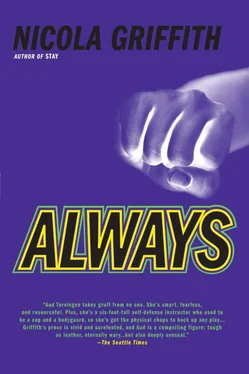“Your little girl, Luz. You would risk a great deal on her behalf.”
“I would.”
“You might even risk sacrificing her goodwill in the short term in order to discuss the prospects for her long-term happiness.”
“I’m prepared, Mor. Just speak.”
“This is very difficult.”
Eric leaned forward. “Your friend has recently been diagnosed—”
“Her name is Kick.”
“Kick has recently been diagnosed with multiple sclerosis.”
“Yes.”
“It is a very unpredictable disease.”
“Yes, it is.”
“What do you know of it?”
I put my spoon down and looked directly at my mother. “Perhaps you should tell me what it is you think I should know.”
“Like any mother, I am only concerned for my daughter’s happiness.”
“I am happy.”
“Yes, but for how long?”
“How long will you and Eric be happy?”
“I don’t know,” she said, and now I was certain they were touching feet beneath the table. “But neither of us has an incurable disease. I… please, Aud, I feel the need to speak.”
I could take one last sip of the lovely wine, remove my napkin, drop it on the table, say good-bye, and walk away. But there were tears in my mother’s eyes. She was not managing me, not negotiating. She was pleading.
“…know that you’ve heard my concerns. And after that, no matter what you choose, you are my daughter, and I love you. I will respect your choices.”
“Good. Because they’re my choices. And MS might be incurable, but it’s treatable.” Silence. “Wouldn’t you agree? Eric?”
Eric looked troubled. “The efficacy of most treatments is as variable as the disease course.”
“There’s a lot of research. You should know that. You’ve been working with those biotech companies.”
“Research is… well, I wouldn’t say this to anyone that wasn’t family but, frankly, there are a lot of lies.”
“I’ve read the studies. Someone at Kick’s stage can be helped.”
“The most optimistic information we have is that thirty or forty percent of people with the very early stages of MS can achieve a thirty or forty percent reduction in the deterioration of their disease.”
After a long pause, I said, “That’s not what I understood from my reading.”
“That’s not what the drug companies want you to understand. The drug companies want you to hope. Forty percent sounds wonderful—it sounds as though everyone who injects themselves with these rather far-ranging immunomodulators will get forty percent better, which is worth all the money, and the side effects, and the pain, and the inconvenience. But I wouldn’t play those odds at a craps table.”
“I didn’t know you played craps.”
My mother made a rare gesture of impatience. “Dice games are not the issue.”
“Fine. What is the issue?”
“Money,” Eric said. “Money and the lies and false hope it breeds. The pharmaceutical companies cast a rosy tint over their research pipeline and their products and their clinical trials. Consider this. All of the current recommended treatments for MS were developed under the orphan disease umbrella. It means there are tax advantages, government grants, and non-competition clauses. An orphan disease, strictly speaking, is one which fewer than two hundred thousand Americans suffer from. Most medical authorities would acknowledge that there are closer to half a million people in this country with MS. There is some evidence to support the opinion that there are very many more than that. Yet the drug companies have found their way around legislation. Preying on the hopes of ill people and their loved ones is easy in comparison.”
“You have obviously spent a lot of time researching this. I appreciate your concern.” I picked up my spoon.
“Aud, Kick’s life may be measurably shorter than yours. She will need a lot of… help as the years progress.”
“Not necessarily. There are people who, ten years after diagnosis, are absolutely no worse than they were before.”
“And those people are unlikely to get worse. Yes,” Eric said. “All true, but—”
“But are you prepared to wait ten years to see?” my mother said. “Aud, she is ill. You will always be the strong one, the healthy one. Partnerships should be equal. You can protect her, yes, but shouldn’t she also be able to protect you?”
Kick, protect me?
“It is more than likely that you will come to resent her because of that, and she you for being healthy.”
I skimmed a spoonful of liquid from the surface of my soup. My hand was trembling. Interesting. I breathed gently. The trembling stilled. “It’s already been pointed out to me that illness is not pretty, it’s not romantic, it’s not easy.” My spoon jerked, and dumped congealing soup back in the bowl with an audible plop. The spoon slid under the warm liquid and one perfect globule shone on the white tablecloth. The same reddish brown as drying blood. “I understand what I’m doing.”
“Do you? Illness can crush hope. It can crush intention…”
A server appeared with a fresh spoon, but I shook my head and gestured for him to take the bowl away.
“…times when illness can be bigger and stronger than we are.”
I focused on that perfect brown-red hemisphere on the white tablecloth. It was slowly sinking into the linen, spreading, losing its shape and focus.
“Aud?”
“There’s always something,” I said. “Unless we brick ourselves up in a box. There is no perfect security. You plan to the best of your ability, and then you improvise. Sooner or later there’s always someone or something bigger or faster or stronger than you. You just do the best you can, and when you run into trouble, you get help.”
My mother was studying me. In the subtle lighting, she seemed older than she was, and more powerful. “Is that what happened with your throat?” she said.
A fish knife lay by my right hand. I picked it up and turned it in my fingers, heavy and cool. It was silver, burnished with the tiny cuts of a thousand dishwashings. “I got my throat cut because I was tired, and careless, and afraid. Because I didn’t understand that when you run into trouble, you get help. You ask your friends, and family, for their support.”
Her eyes were aquamarine and fathomless.
“You are adult,” she said. “We will leave the matter there. I trust your judgment. I ask only that you do judge and don’t jump blindly. When you choose, you will have my absolute support.” She didn’t have to make extravagant vows. If I chose Kick, she would accept us without reservation and never remind me of this conversation by word or deed; she would close over it like the ocean over a swimmer’s head. I remembered Julia on the fjord, saying,… a land that doesn’t know compromise… black or white, yes or no, on or off. My mother’s soul was still Norwegian, in a way that mine was not.
The next course was Dungeness crab with beets, two ingredients—like the lentils and cherry compote—I would never have dreamt of putting together, but that worked perfectly.
She and Eric were not looking at each other but I could tell that, in the way of some couples, they were intensely aware of each other’s body language and were exchanging a private communication. I drank the last of my wine.
“In honor of our last night,” Eric said, “I believe we should have something special from the wine list.”
He consulted the sommelier, and between them they decided on a 1983 Château Margaux, which was brought up from the cellar with great ceremony. Eric gestured for me to taste.
I held the glass to the light. The wine was the color of an ancient garnet, something set long ago in a barbaric Anglo-Saxon brooch, acquiring depth and gravity through the ages. It unfurled in my mouth like a cloud.
Читать дальше












